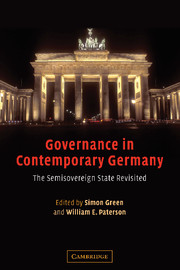Book contents
- Frontmatter
- Contents
- List of figures
- List of tables
- List of contributors
- Acknowledgments
- List of abbreviations
- 1 Introduction: Semisovereignty Challenged
- 2 Institutional Transfer: Can Semisovereignty be Transferred? The Political Economy of Eastern Germany
- 3 Political Parties
- 4 Federalism: the New Territorialism
- 5 Shock-Absorbers Under Stress: Parapublic Institutions and the Double Challenges of German Unification and European Integration
- 6 Economic Policy Management: Catastrophic Equilibrium, Tipping Points and Crisis Interventions
- 7 Industrial Relations: From State Weakness as Strength to State Weakness as Weakness. Welfare Corporatism and the Private Use of the Public Interest
- 8 Social Policy: Crisis and Transformation
- 9 Immigration and Integration Policy: Between Incrementalism and Non-decisions
- 10 Environmental Policy: the Law of Diminishing Returns?
- 11 Administrative Reform: Is Public Bureaucracy Still an Obstacle?
- 12 European Policy-making: Between Associated Sovereignty and Semisovereignty
- 13 Conclusion: Semisovereignty in United Germany
- References
- Index
11 - Administrative Reform: Is Public Bureaucracy Still an Obstacle?
Published online by Cambridge University Press: 05 June 2012
- Frontmatter
- Contents
- List of figures
- List of tables
- List of contributors
- Acknowledgments
- List of abbreviations
- 1 Introduction: Semisovereignty Challenged
- 2 Institutional Transfer: Can Semisovereignty be Transferred? The Political Economy of Eastern Germany
- 3 Political Parties
- 4 Federalism: the New Territorialism
- 5 Shock-Absorbers Under Stress: Parapublic Institutions and the Double Challenges of German Unification and European Integration
- 6 Economic Policy Management: Catastrophic Equilibrium, Tipping Points and Crisis Interventions
- 7 Industrial Relations: From State Weakness as Strength to State Weakness as Weakness. Welfare Corporatism and the Private Use of the Public Interest
- 8 Social Policy: Crisis and Transformation
- 9 Immigration and Integration Policy: Between Incrementalism and Non-decisions
- 10 Environmental Policy: the Law of Diminishing Returns?
- 11 Administrative Reform: Is Public Bureaucracy Still an Obstacle?
- 12 European Policy-making: Between Associated Sovereignty and Semisovereignty
- 13 Conclusion: Semisovereignty in United Germany
- References
- Index
Summary
Public administration and public policies aimed at its reform occupy a central position in Peter Katzenstein's (1987) analysis of the semisovereign state. They appear in four distinct ways. First, a decentralised bureaucracy is the third of four defining features of the ‘decentralised state’ that Katzenstein contrasts with ‘centralised society’. The fourth feature, the constrained power of the chancellor, is also closely connected to the administrative organisation of the German state, since the constitutional right of ministers to run their departments without interference from the chancellor ‘reinforces the bureaucratic fragmentation (Ressortprinzip) inherent in the federal bureaucracy’ (1987, p. 23). Second, two of the three ‘nodes’ of the policy network – co-operative federalism and parapublic institutions – are directly associated with public administration. Co-operative federalism is, to a large extent, about co-operation between the administrations at local, Land and federal levels, and many parapublic institutions – such as the Federal Labour Office (Bundesanstalt für Arbeit) – are public authorities in all but name. Third, public administration is key to explaining patterns of policy development, for ‘West German bureaucracy presents structural obstacles to large-scale changes no less formidable than the interaction of coalition governments, co-operative federalism, and parapublic institutions’ (1987, p. 255). Finally, administrative reform serves as an illustrative case study for the ‘analysis of the organization and political capacities of the West German state’ (1987, pp. 254–5).
It is not difficult to see why public administration and administrative policy should be at the heart of the debate about the semisovereign state.
- Type
- Chapter
- Information
- Governance in Contemporary GermanyThe Semisovereign State Revisited, pp. 239 - 260Publisher: Cambridge University PressPrint publication year: 2005



